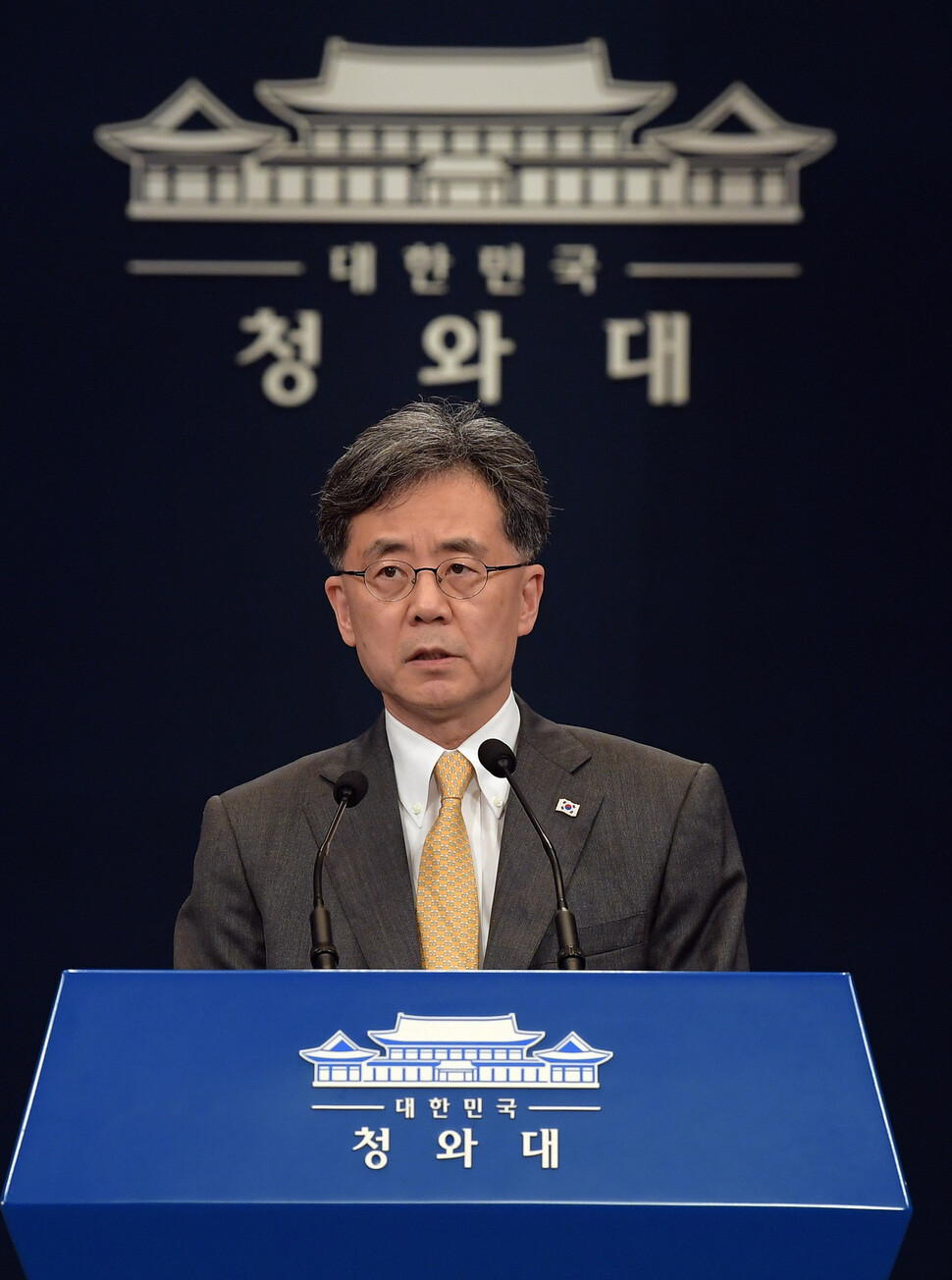hankyoreh
Links to other country sites 다른 나라 사이트 링크
Blue House expresses deep dismay over Japan removing S. Korea from “white list”

The Blue House and administration expressed deep dismay on Aug. 28 toward the Japanese government’s implementation that day of measures removing South Korea from its white list of countries benefiting from expedited export procedures.
“Japan has gone ahead with its measures to remove us from their white list as of time, despite our administration’s ongoing requests that it withdraw the economic relation measures it adopted in response to our Supreme Court’s forced labor conscription ruling,” said Kim Hyun-chong, second deputy chief of the Blue House National Security Office, in a press conference at the Blue House that day.
“The administration shares its deep dismay over this measure,” he said.
Kim also disputed Tokyo’s claims that Seoul tied the export control measures to security matters with its termination of the two sides’ General Security of Military Information Agreement (GSOMIA).
“First, the Japanese administration claimed that our relationship of trust had been damaged by the forced labor conscription issue. Then it claimed later that ‘problems’ with our export permit system were having a negative impact on Japanese security,” he noted.
“I must point out once again that it is Japan that has been tying security issues to export control measures,” he said.
Kim also took direct aim at Japanese Foreign Minister Taro Kono, who said in reference to the 1965 South Korea-Japan Claims Settlement Agreement that “if South Korea is hoping to rewrite history, that is not possible.”
“If anything is rewriting history, it is Japan,” Kim declared. Replying to the Japanese administration’s demands that Seoul rectify the Supreme Court ruling on the labor conscription issue, he said, “Government interference with the judiciary is not something that is allowed in a democratic state.”
Blue House: “Japan hurting trilateral relations by linking security with export controls”
Declaring that the “ball is in Japan’s court,” Kim called on Tokyo to change its stance.
“It is Japan that has harmed South Korea-US-Japan relations with its arbitrary and hostile economic retaliation measures against us,” he said. “We look forward to Japan accepting the hand we have extended to it, as President Moon Jae-in mentioned in his National Liberation Day address,” he added.
Other statement of deep dismay and protest also emerged from the administration. During an expanded meeting of ministers in agencies involved in responding to Japan’s export controls at the Government Complex in Sejong that day, Prime Minister Lee Nak-yeon said, “I find it terribly dismaying that Japan continues to impose these unjust measures.”
“I urge Japan to avoid making the situation any worse to agree in good faith to dialogue toward restoring South Korea-Japan relations,” he continued. The Foreign Ministry summoned Japanese Ambassador to South Korea Yasumasa Nagamine to convey a message of protest and demand the measure’s withdrawal.
Meanwhile, the Japanese government took its first steps in implementing an amended Export Trade Control Order downgrading South Korea from its “Group A” (white list) to “Group B” as of midnight that day. While Japanese exporters previously only had to receive one general permit every three years to export strategic goods to South Korea, they are required as of now to receive case-by-case permits as a rule for all exports believed to at risk of diversion to military purposes. While the Japanese government is entitled to grant across-the-board permits (with a validity period of three years) through its “special general comprehensive permit” system, the possibility of its pursuing regulations during the system’s implementation process has fanned uncertainties in South Korea. Also, because of “catch-all” provisions for nearly all items apart from food and lumber, individual permits must be received even for non-strategic goods judged to be at risk of diversion to military uses.
By Seong Yeon-cheol, Noh Ji-won and Cho Ki-weon, Tokyo correspondent
Please direct comments or questions to [english@hani.co.kr]

Editorial・opinion
![[Column] Samsung’s ‘lost decade’ and Lee Jae-yong’s mismatched chopsticks [Column] Samsung’s ‘lost decade’ and Lee Jae-yong’s mismatched chopsticks](https://flexible.img.hani.co.kr/flexible/normal/500/300/imgdb/original/2024/0512/3017154788490114.jpg) [Column] Samsung’s ‘lost decade’ and Lee Jae-yong’s mismatched chopsticks
[Column] Samsung’s ‘lost decade’ and Lee Jae-yong’s mismatched chopsticks![[Correspondent’s column] The real reason the US is worried about Chinese ‘overcapacity’ [Correspondent’s column] The real reason the US is worried about Chinese ‘overcapacity’](https://flexible.img.hani.co.kr/flexible/normal/500/300/imgdb/original/2024/0510/5217153290112576.jpg) [Correspondent’s column] The real reason the US is worried about Chinese ‘overcapacity’
[Correspondent’s column] The real reason the US is worried about Chinese ‘overcapacity’- [Editorial] Yoon’s gesture at communication only highlights his reluctance to change
- [Editorial] Perilous stakes of Trump’s rhetoric around US troop pullout from Korea
- [Guest essay] Preventing Korean Peninsula from becoming front line of new cold war
- [Column] The state is back — but is it in business?
- [Column] Life on our Trisolaris
- [Editorial] Penalties for airing allegations against Korea’s first lady endanger free press
- [Editorial] Yoon must halt procurement of SM-3 interceptor missiles
- [Guest essay] Maybe Korea’s rapid population decline is an opportunity, not a crisis
Most viewed articles
- 1[Correspondent’s column] The real reason the US is worried about Chinese ‘overcapacity’
- 2[Book review] Who said Asians can’t make some good trouble?
- 3[Column] “Hoesik” as ritual of hierarchical obedience
- 4Yoon rejects calls for special counsel probes into Marine’s death, first lady in long-awaited presse
- 5[Editorial] Human trafficking in S. Korea
- 6Behind bellicose bluster, N. Korea is turning airfields into greenhouse farms
- 7[Editorial] Penalties for airing allegations against Korea’s first lady endanger free press
- 8Yoon’s broken-compass diplomacy is steering Korea into serving US, Japanese interests
- 9In Yoon’s Korea, a government ‘of, by and for prosecutors,’ says civic group
- 10Filipinas forced into prostitution on the rise in S.Korea